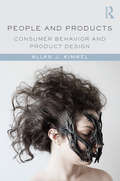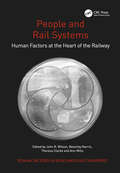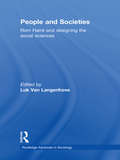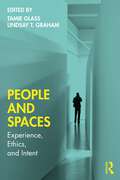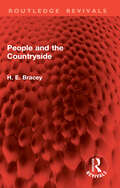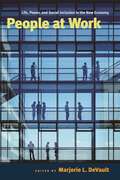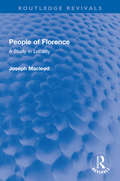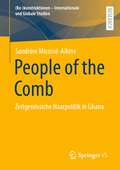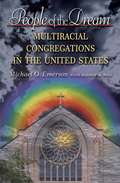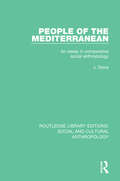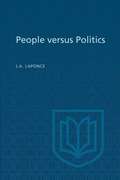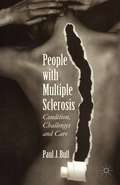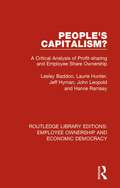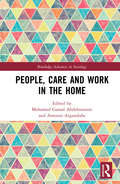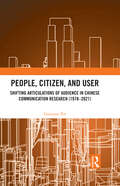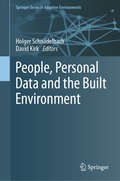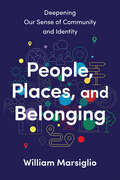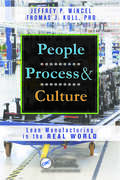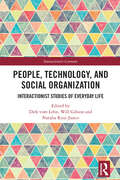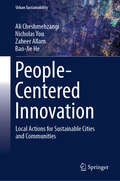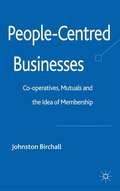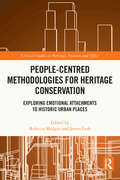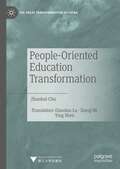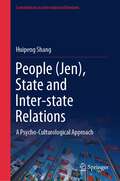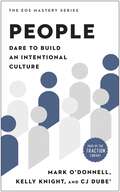- Table View
- List View
People and Products: Consumer Behavior and Product Design
by Allan J. KimmelBy examining the interface between consumer behavior and new product development, People and Products: Consumer Behavior and Product Design demonstrates the ways in which consumers contribute to product design, enhance product utility, and determine brand identity. With increased connectedness and advances in technology, consumers and marketers are more closely connected than ever before. Yet consumer behavior texts often overlook the application of the subject to product design, testing, and success. This is the first book to explore this interface in detail, exploring such issues as: the attributes and qualities that consumers demand from products and services, and social and cultural forces to be aware of; design and form and how they facilitate product usage; technological developments and the ways they have changed how consumers interact with products; product disposal and sustainability; emerging and future trends in consumer behavior and product development and design. This exciting volume is relevant to anyone interested in marketing, consumer behavior, product development, technology, engineering, design, and brand management.
People and Rail Systems: Human Factors at the Heart of the Railway (Human Factors in Road and Rail Transport)
by John R. Wilson Beverley Norris Ann MillsFollowing on from 2005's Rail Human Factors: Supporting the Integrated Railway, this book brings together an even broader range of academics and practitioners from around the world to share their expertise and experience on rail human factors. The content is both comprehensive and cutting-edge, featuring more than 55 chapters addressing the following topics: ¢ Passengers and public ¢ Driver performance and workload ¢ Driving and cognition ¢ Train cab and interfaces: simulation and design ¢ Routes, signage, signals and drivability ¢ Signalling and control of the railway ¢ Planning for the railway ¢ Engineering work and maintenance ¢ Level crossings ¢ Accidents and safety ¢ Human error and human reliability ¢ SPADs: signals passed at danger ¢ Human factors integration and standards ¢ Impairments to performance ¢ Staff competencies and training. People and Rail Systems: Human Factors at the Heart of the Railway will be invaluable for all those concerned with making railways safer, more reliable, of higher quality and more efficient. It will be essential reading for policy-makers, researchers and industry around the world.
People and Societies: Rom Harré and Designing the Social Sciences (Routledge Advances in Sociology)
by Luk Van LangenhoveRom Harré has pushed the boundaries of our thinking about people and societies and has challenged the orthodox philosophy of science and social psychology. His countless books and articles have inspired generations of scholars in philosophy, psychology, linguistics, cognitive science and social theory. The diversity of his work makes that some see him as a leading figure in the critical realist school of philosophy of science, other as a key player in developing a social constructionist approach to psychology. The present volume brings together a careful selection of his key writings and presents them in a framework that stresses the evolution of his thinking as well as the place of his thinking in ongoing debates in different disciplines. The overall theme is the study of people and their ways of life. This is the first book that gives readers a systematic introduction in the conceptual universe of this towering figure.
People and Spaces: Experiences, Ethics, and Intent
by Tamie Glass Lindsay T. GrahamPeople and Spaces: Experience, Ethics, and Intent examines the dynamic relationship between built environments and human behavior in today's rapidly evolving world.Co-edited by a designer and a psychologist, this interdisciplinary collection reveals how the spaces we inhabit shape and reflect our self-expression, social structures and cultural values. Drawing on diverse perspectives, case studies and innovative research, People and Spaces equips readers from any discipline with practical human-centric knowledge to enhance environments in meaningful ways. This blend of essays and expert insights demonstrates the value of intentional approaches to design and research and offers actionable guidance for creating supportive and sustainable environments.This book is relevant to a broad audience, including scholars, professionals, and students in architecture, interior design, psychology, and related fields, as well as industry practitioners interested in the intersection of built environments and human experience. It is an essential resource for those seeking to understand and influence the dynamic relationship between people and space.
People and the Countryside (Routledge Revivals)
by H. E. BraceyRapid and radical changes were taking place in the countryside. Originally published in 1970, People and the Countryside discusses the legislation affecting the countryside which appeared in the late 1940s and the work of the Countryside in 1970 Conferences with which the author had been closely connected.The book examines the role played by man in the shaping of the British landscape, and discusses the considerable changes there have been in our time in, for example, the number and distribution of people over the country and the availability of work in the countryside. Dr Bracey assesses the influence of developments in mobility on life in the country, and looks at rural local government with especial regard to land-use planning.As more people used more of the countryside for many new purposes, there was a growing concern about access to open spaces, common land and forest, and about the provision of facilities and the conservation of amenities. Dr Bracey shows how the Countryside Act of 1968, which he describes as a townsman’s charter for the greater use of the countryside for recreation, at the same time pays heed to the needs of the countryside and the claims of country people. The final chapters of the book look at the Government White Paper, ‘Leisure in the Countryside’, and explore its real meaning in the context of leisure in general, the recreational use of land, the facilities needed for exploiting and conserving countryside amenities, and the need for ‘management’ of the countryside in the 1970s. Today it can be read in its historical context.
People at Work: Life, Power, and Social Inclusion in the New Economy
by Marjorie L. DeVaultPeople at Work is noted sociologist Marjorie L. DeVault’s groundbreaking collection of original essays on the complexities of the modern-day workplace. By focusing on the lived experiences of the worker, not as an automaton on an assembly line, but as an embodied human of flesh and bone, these essays offer important insight on the realities of the workplace, and their effects on life at home and in communities. With contributions from some of today’s top scholars, each essay is a detailed case study of a different aspect of the working world.Compelling, lively, and sometimes chilling, the contributors address issues from disability rights to immigrant labor, welfare reforms to budget cuts, competition to personal motivations. Each one valuable on its own, the essays in People at Work combine to illuminate the hurdles that workers of all backgrounds struggle with and, more broadly, the impact of change on workers’ lives in the new, increasingly global, economy.
People of Florence: A Study in Locality (Routledge Revivals)
by Joseph MacleodFirst Published in 1968, People of Florence raises the question what makes a city? This is neither a guidebook nor a typical sociological treatise, but the portrait of a people. Trinkets of history are lightly painted in to give background to what the author calls ‘locality’: Florence of today as formed by her past and by the physical conditions of Tuscany. Two principal chapters are intimately concerned with the flood of 1966. The author also takes us through the relation between the individual liberties in Florence and the bureaucratic controls of the Government in Rome, along with the architecture, art, music, theatre, song birds, flowers, trees, food and drink, public ceremonies, games, ancient rites, and human stories. This book will be an interesting read for scholars and researchers of sociology, urban history, social anthropology, cultural studies and for general readers interested to know about Florence.
People of the Comb: Zeitgenössiche Haarpolitik in Ghana ((Re-)konstruktionen - Internationale und Globale Studien)
by Sandrine Micossé-Aikins"Afrika" dient in vielen haarpolitischen Debatten nur als positive und teilweise sehr unpräzise definierte Projektionsfläche, die für eine bessere vorkoloniale Schwarze Welt steht. Nur wenig Aufmerksamkeit wurde bisher darauf verwendet, die tatsächlich gegenwärtig gelebte Haarkultur- und -politik in verschiedenen kontinentalafrikanischen Kontexten auch auf ihr Eingebettet-Sein in globale, historisch gewachsene Hierarchien hin zu betrachten. Oft wird übersehen, dass auch hier – auf ihre eigene Weise – rassistische Ideologien und insbesondere weiße Vorherrschaft als koloniale Kontinuitäten wirken, und zeitgenössische Haarkultur mitprägen. Die vorliegende Arbeit möchte einen Beitrag dazu leisten, diese Dynamiken besser zu verstehen. Dabei werden jedoch auch relevante Facetten Schwarzen Selbstverständnisses und gelebte ästhetische Praktiken beleuchtet, die über die Auseinandersetzung mit weißer Vorherrschaft hinausweisen.
People of the Dream: Multiracial Congregations in the United States
by Michael O. EmersonIt is sometimes said that the most segregated time of the week in the United States is Sunday morning. Even as workplaces and public institutions such as the military have become racially integrated, racial separation in Christian religious congregations is the norm. And yet some congregations remain stubbornly, racially mixed. People of the Dream is the most complete study of this phenomenon ever undertaken. Author Michael Emerson explores such questions as: how do racially mixed congregations come together? How are they sustained? Who attends them, how did they get there, and what are their experiences? Engagingly written, the book enters the worlds of these congregations through national surveys and in-depth studies of those attending racially mixed churches. Data for the book was collected over seven years by the author and his research team. It includes more than 2,500 telephone interviews, hundreds of written surveys, and extensive visits to mixed-race congregations throughout the United States. People of the Dream argues that multiracial congregations are bridge organizations that gather and facilitate cross-racial friendships, disproportionately housing people who have substantially more racially diverse social networks than do other Americans. The book concludes that multiracial congregations and the people in them may be harbingers of racial change to come in the United States.
People of the Mediterranean: An Essay in Comparative Social Anthropology (Routledge Library Editions: Social and Cultural Anthropology)
by J. DavisThe Mediterranean countries have long attracted the attention of social anthropologists, from Frazer and Durkheim to the present day. In this volume, first published in 1977, Dr Davis reviews the extensive anthropological material collected and published by people who have worked in the area and claims that social anthropologists have a distinctive opportunity to compare similar kinds of institution and process in a variety of contexts – political, economic, bureaucratic, religious. He examines countries, tribes and communities stretching from Spain all the way round the Mediterranean and back along the coast of North Africa. In chapters on economics, stratification, politics, family and kinship, he has found it possible and sensible to set Albanian and Berber tribesmen beside each other, and to discuss Italian and Lebanese peasants in the same paragraph. The result is both a survey of the anthropological material and an essay in comparison, founded on a critique of the work of his predecessors and colleagues. The last chapter is an account of the uses anthropologists have made of the historical sources available to them.
People versus Politics: A study of opinions, attitudes, and perceptions in Vancouver-Burrard (The Royal Society of Canada Special Publications)
by J. A. LaponceThis lively and sophisticated study describes the opinions and attitudes of the electors in one electoral district (Vancouver-Burrard) during the federal and provincial elections held from 1963 to 1965. Based on interviews with a random sample of 800 people in the riding, it examines voting patterns in relation to age, sex, religion, ethnicity, social class, party preference, knowledge of politics, and level of education. Using these data Professor Laponce measures and identifies the distinguishing characteristics of voters and non-votes; of Liberals, Conservatives, New Democrats, and Social Creditors; of party "faithfuls" and party "migrants" (in particular those who support different parties in provincial and federal elections); and it describes the electors' attitudes to the parties competing for their support. The results of the study are compared to the results of surveys carried out in other parts of Canada, Britain, and the United States. Important sociologically for its contribution to research in the establishment of universal political patterns, this study also has immediate application to present political events in Canada and the United States.
People with Multiple Sclerosis: Condition, Challenges and Care
by Paul J. BullMultiple sclerosis is an incurable neurological disease of unknown cause with a fearful reputation for generating disability, unemployment, poverty and early death. This book critically surveys the current state of multiple sclerosis research, demonstrating the shortfall of current research undertaken on the lives of people with multiple sclerosis.
People's Capitalism?: A Critical Analysis of Profit-Sharing and Employee Share Ownership (Routledge Library Editions: Employee Ownership and Economic Democracy #1)
by Jeff Hyman Harvie Ramsay Lesley Baddon Laurie Hunter John LeopoldFirst published in 1989. In the decade before this book was originally published, employee share ownership and profit sharing had increased markedly as successive governments introduced fiscal legislation promoting their uses. Yet how successful had ‘people’s capitalism’ been? The Glasgow study was a major empirical investigation into this issue and was a response to the need for an independent assessment. It discusses how attitudes to ownership had changed and how these, in turn, related to attitudes to work. It also addresses the implications of profit sharing and employee share ownership for industrial relations both for individual companies and at a national level.
People, Care and Work in the Home (Routledge Advances in Sociology)
by Mohamed Gamal Abdelmonem Antonio ArgandoñaIntroducing novel theoretical, empirical and practical investigations with case studies from UK, Europe, South America and South East Asia, the book offers a novel global outlook on how contemporary homes are facing genuine challenges from operational, economic, spatial, social and wellbeing perspectives. The changing demographics of our modern society have inevitably impacted the dynamics and relationships within the home from being personal and private to that of multiple work relationships; domestic work, care for older people, or supporting people with special needs. Whilst the home is a concept universally experienced, permeating every aspect of our lives, it remains an entity whose influence on health and wellbeing is poorly understood. This book brings together 17 different contributions from scholars, researchers and practitioners from different disciplinary and professional backgrounds including three feature articles by leading figures, such as Lord Best and Baroness Hollins. The chapters are organised within three parts that look at the triangle of people + work + care in the home. At a time when homes are increasingly becoming local hubs for care and wellbeing, this volume is a critical and useful addition to current literature in the social sciences, humanities, economics, culture, care and wellbeing in the domestic sphere.
People, Citizen, and User: Shifting Articulations of Audience in Chinese Communication Research (1978 – 2021)
by Guiquan XuThe book examines the changing discourses of Chinese audience research in the past four decades, aiming to shed light on the complicated relationships among China’s media, audiences, and society. With the new sociology of knowledge, it adopts Laclau and Mouffe’s discourse theory as a meta-theoretical framework and interprets the concept of audience as a floating signifier. Based on the corpus of Chinese academic journal papers, the author divides the scope of analysis into four phases. In each period, Chinese audience research was related closely to the changing societal and academic contexts and hegemonic struggle as a whole. In addition, it discusses the relation between ‘western’ audience theories and Chinese audience research, as well as the contingency and rigidity of discourses in Chinese audience research. The book contributes to the understanding of Chinese communication research in the changing societal context and will be valuable for scholars of media and communication studies or China studies.
People, Personal Data and the Built Environment (Springer Series in Adaptive Environments)
by David Kirk Holger SchnädelbachPersonal data is increasingly important in our lives. We use personal data to quantify our behaviour, through health apps or for 'personal branding' and we are also increasingly forced to part with our data to access services. With the proliferation of embedded sensors, the built environment is playing a key role in this developing use of data, even though this remains relatively hidden. Buildings are sites for the capture of personal data. This data is used to adapt buildings to people's behaviour, and increasingly, organisations use this data to understand how buildings are occupied and how communities develop within them. A whole host of technical, practical, social and ethical challenges emerge from this still developing area across interior, architectural and urban design, and many open questions remain.This book makes a contribution to this on-going discourse by bringing together a community of researchers interested in personal informatics and the design of interactive buildings and environments. The book’s aim is to foster critical discussion about the future role of personal data in interactions with the built environment.People, Personal Data and the Built Environment is ideal for researchers and practitioners interested in Architecture, Computer Science and Human Building Interaction.
People, Places, and Belonging: Deepening Our Sense of Community and Identity
by William MarsiglioPlace matters – for good and bad. Infinitely diverse in form, place embodies the action settings where social life happens. Often fighting to preserve a sense of group belonging in the process, we design places to reflect our values and interests. With an eye on our rapidly changing world, People, Places, and Belonging explores how social realities at every level are affected by the places we collectively forge across various social domains. The book shows how place-related circumstances can promote personal empowerment, civic engagement, and social and environmental justice. Discussing places that affect personal and social well-being, including homes, communities, vehicles, and the metaverse, William Marsiglio illustrates how a web of social processes involving claims, attachments, rituals, and transitions (CART) structure our experiences in place. The author argues that we can use decision-making principles to enhance our attachments, encourage supportive rituals, smooth out transitions, and manage claims with less conflict and more social justice. Armed with a heightened place consciousness and ethical principles, People, Places, and Belonging ultimately posits that we must individually and collectively build places that enrich our lives, celebrate the communal spirit, and foster social equity and ecological justice.
People, Process, and Culture: Lean Manufacturing in the Real World
by Jeffrey P. Wincel Thomas J. Kull, PhDExamining Lean processes in the context of the authors’ academic research in-progress, People, Process, & Culture: Lean Manufacturing in the Real World illustrates the impact of culture on the implementation of Lean Manufacturing (LM) across various geographic and cultural areas. It identifies cultural values, as examined against Lean manufacturing disciplines, and derives culturally based Lean Manufacturing (LM) values. It then assesses these cultural values in light of specific LM components, such as PULL systems and TPM, to demonstrate varying perspectives and applications. Illustrates global cultural influences on Lean implementation Uses academic research as the foundation of the material Examines the many Lean components currently in use around the world Building on the continued prominence of LM as the preferred operational approach, the book supplies time-tested advice to help you sort through the flood of information on Lean techniques and culture. It examines the numerous Lean components currently being deployed successfully around the world and identifies the limitations that can result from the varying interpretations and applications of Lean systems.Lean culture is all about Lean vision, mission, and values. This book not only identifies the Lean values required, but also supplies the understanding to integrate these values across all levels of your organization. The book will be especially helpful to international corporate managers working to demystify the sometimes hard-to-understand characteristics of Lean transformation.
People, Technology, and Social Organization: Interactionist Studies of Everyday Life (Interactionist Currents)
by Will Gibson Dirk Vom Lehn Natalia Ruiz-JuncoThis insightful and accessible book is a response to the increasing important role that technology plays in everyday life, and the urgent need for empirical studies that analyse the impact of technology on social practices. The chapters in this co-edited collection reveal how technology is oriented to and embedded within the social organization of action in a wide range of settings and institutions, including education, markets, arts and culture, health and social care, media, politics, and science. In their analyses, the contributing authors adopt interactionist perspectives to explore how the meanings of technology emerge and are negotiated within and through action and interaction. The volume comprises 14 empirical chapters from authors working in fields such as symbolic interactionism, ethnomethodology, conversation analysis, discourse methods, ethnographic enquiry, video-based methods, and others. The chapters are framed by an introduction and a concluding discussion by the co-editors which draws out the key themes and issues that the individual chapters speak to, and show the importance of these themes for the social sciences and for society. The book is primarily aimed at researchers in the social sciences, including sociology, social psychology, organization studies, and beyond whose work is concerned with the interplay between social interaction, technology, and institutions.
People-Centered Innovation: Local Actions for Sustainable Cities and Communities (Urban Sustainability)
by Ali Cheshmehzangi Zaheer Allam Bao-Jie He Nicholas YouAs a follow-up to the book titled &“Harnessing Urban Innovation to Unlock the Sustainable Development Goals&”, this collection examines transformative urban solutions through 15 internationally recognized case studies submitted to the 6th Guangzhou International Award for Urban Innovation in 2023. It provides valuable insights into the driving forces behind sustainable urban development, aligning closely with the United Nations' Sustainable Development Goals (SDGs). The main focus of the book is on people-centered approaches to urban innovation, demonstrating how grassroots initiatives can tackle complex urban challenges and contribute to global sustainability targets. Each case study presents innovative strategies implemented by communities worldwide, showcasing how local actions can greatly impact sustainability and resilience. The varied examples highlight a spectrum of urban issues, including affordable housing, sustainable transportation, climate adaptation, and social inclusion, reflecting the diverse nature of urban innovation. Key Features and Benefits: Varied Global Case Studies: The book includes fifteen case studies from different regions, each presenting unique solutions to urban challenges. These examples illustrate how various cultures and contexts address common problems, providing a rich array of ideas and practices. This makes it an essential resource for urban planners, policymakers, and community leaders seeking inspiration and guidance. Emphasis on People-Centered Approaches: The book emphasizes the importance of people-centered innovation, which prioritizes community involvement and local knowledge. By focusing on how local populations engage with and drive urban initiatives, the book highlights the significance of inclusivity and participatory processes in achieving sustainable outcomes. Alignment with the SDGs: Each case study is connected to specific Sustainable Development Goals, demonstrating how local actions contribute to global sustainability objectives. The book illustrates how grassroots initiatives address key areas such as poverty reduction, climate action, and sustainable cities and communities, highlighting the critical role of local efforts in achieving the broader SDG agenda.
People-Centred Businesses
by Johnston BirchallSo what is a member-owned business? What does it look like? How can we distinguish it from an investor-owned business? The crucial distinction is between a business that is people-centred, and one that is money-centred. This book explores the growing number of companies which use this model and their wider significance in society.
People-Centred Methodologies for Heritage Conservation: Exploring Emotional Attachments to Historic Urban Places (Critical Studies in Heritage, Emotion and Affect)
by Rebecca Madgin James LeshThis book presents methodological approaches that can help explore the ways in which people develop emotional attachments to historic urban places. With a focus on the powerful relations that form between people and places, this book uses people-centred methodologies to examine the ways in which emotional attachments can be accessed, researched, interpreted and documented as part of heritage scholarship and management. It demonstrates how a range of different research methods drawn primarily from disciplines across the arts, humanities and social sciences can be used to better understand the cultural values of heritage places. In so doing, the chapters bring together a series of diverse case studies from both established and early-career scholars in Australia, China, Europe, North America and Central America. These case studies outline methods that have been successfully employed to consider attachments between people and historic places in different contexts. This book advocates a need to shift to a more nuanced understanding of people’s relations to historic places by situating emotional attachments at the core of urban heritage thinking and practice. It offers a practical guide for both academics and industry professionals towards people-centred methodologies for urban heritage conservation.
People-Oriented Education Transformation (The Great Transformation of China)
by Zhaohui ChuThis book explores the reforms sweeping China's educational sector. Traditionally dominated by rote learning, China's educational system has increasingly been criticized by the rising middle class for failing to foster creativity, for arbitrary placement of students, and for fostering regional inequities. Reforms to make Chinese education "people-oriented" are slowly but surely gaining steam, as the sector embraces comprehensive reforms. This book will be of interest to journalists, educators, and China watchers.
People: A Psycho-Culturological Approach (Contributions to International Relations)
by Huipeng ShangThis book explores the relationship between the “human constant” (Jen) of the four large-scale civilizational societies—China, the USA, Japan, and India—and their international behavior, response patterns, and interaction with the international system. The book analyzes the characteristics and limitations of the current international system, as well as the way it is related to the Western type of “human constant”. It also analyzes the challenges facing China in its integration into the international system. This book aims to explore international relations from the combined psychological and cultural perspective. The key concept of this book is “Jen”, which contains a distinct Chinese cultural experience, into the theory of international relations. Unlike other IR books to treat state as the main political actor, the book analyzes both the political aspects of state as an “organizational entity” and its civilizational aspects as a “civilizational entity”; hence, it proposes a new ontology of international relations. By integrating the concept of “Jen” based on the unique Chinese cultural experience into the theory of international relations, the book reveals the interactive nature of relationship between the international system and “human constant”. The book explains the causal relationship between state’s behavior and its “human constant”, analyzes the cultural characteristics of state actors and the international system, and tries to provide a new theoretical framework for understanding culture and modernity.
People: Dare to Build an Intentional Culture (The EOS Mastery Series)
by Mark O'Donnell Kelly Knight CJ DuBe'Master the People Component of your business by building an intentional culture with the Entrepreneurial Operating System (EOS). The second installment of the Traction Library&’s EOS Mastery Series, People gives readers all the tools they need to create a thriving workplace culture and shows why it&’s an absolutely essential part of any successful business. Hit-or-miss hiring, flagging productivity, infighting, employees in positions not suited to their strengths, or an inability to attract and retain good candidates are just some of the symptoms of a haphazard company. And they won&’t go away on their own—you have to have the courage to build an intentional culture. Using the proven EOS heart-centered leadership approach, readers will learn how to: Identify and implement your company&’s Core Values Adopt healthy cultural habits without overcomplicating things Attract, hire, and retain the right people Creating an intentional culture isn&’t optional—it&’s crucial to ensuring the future of your business and improving the quality of your life. People will teach entrepreneurs how to get their employees on board and on the same page for a culture overhaul.
